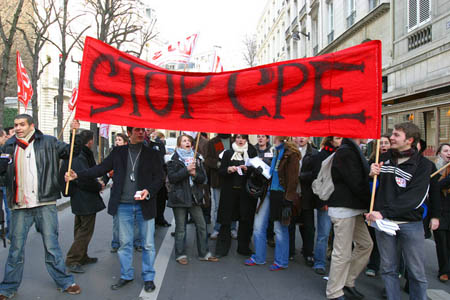Hundred thousands of young people are protesting against the so-called First Employment Contract (Contrat Première Embauche — CPE) allowing employers to lay off under-26s without explanation within the first two years of a contract.
Linking back to what Alana wrote in November 2005, when the riots began in Clichy-sous-Bois, the International Herald Tribune went back to the Eastern banlieu of Paris at the times of rising youth protests against the C.P.E.
Read on to see what the International Herald Tribune came up with.
Clichy-sous-Bois, France. © IHT 2006
This article was written by Katrin Bennhold for and published by the International Herald Tribune on Wednesday, March 15, 2006 under the headline “Even those it’s supposed to help, it seems, oppose French jobs law.”

Donga Brahim is the kind of young person Prime Minister Dominique de Villepin might have had in mind when he drew up a new labor law that has set off student protests across France.
Brahim, 21, a Frenchman of Malian descent, left high school without a diploma. For the last three years he has struggled to make ends meet via short- term contracts followed by bouts of unemployment.
His world in Clichy-sous-Bois, the rundown immigrant suburb northeast of Paris where last year’s riots started, could not be further from that of the students blockading most of France’s universities. But Brahim is just as opposed as they are to the new labor law, which seeks to encourage companies to hire young people by making it easier to lay them off.
“The students are also demonstrating for us,” he said, leaning against a friend’s dilapidated car outside a row of suburban tower blocks. Like the protesters, he says he believes the law will make young people more vulnerable to losing their jobs. “This is not about color or about whether you are in the suburbs or not,” he said. “This is about all young people – white, black and Arab.”
For Villepin, who has made the new law a symbol of his leadership, this could be about his political future. The Gaullist prime minister faces a crucial week, with protests against the legislation growing stronger by the day and even those it was designed to help speaking out against it.
The measure was conceived in the wake of the November riots, which took place in neighborhoods with jobless rates that sometimes reach 40 percent among the young. Passed last week and due to take effect in April, it created a new contract allowing employers who hire people under the age of 26 to fire them without justification during the first two years.
This sharp departure from standard French ideas about job security was pounced on by students and labor union members, who marched in the hundreds of thousands last week to protest the law. Villepin’s political opponents have joined the fray, with the opposition Socialists vehemently denouncing the law and even some politicians on the right now questioning its wisdom.
Villepin went on television Sunday night and refused to withdraw the law, sparking new protests by students. The disturbances have disrupted about 45 French campuses, the Education Ministry said, and a growing number of deans are calling for the legislation to be suspended. More nationwide protests are set for Thursday and Saturday.
As students in Paris’s Latin Quarter prepare for the protests, Brahim, in Clichy-sous-Bois, proudly exhibits the back of his hooded black sweatshirt: It bears the outlines of a large “93,” the number identifying the Seine-Saint Denis department north of Paris that is home to a large immigrant population.
Brahim says he does not know any university students in Paris and has little in common with them. He is now employed at a car workshop on a temporary contract. But he says he prefers that to the contract proposed by Villepin, which he says would make young people of immigrant origin even more vulnerable to being fired for no reason, without creating any more jobs.
“They say this is their answer to the riots,” he said, “but what we really need is a law against discrimination.”
Not all young men in the disaffected suburbs outside Paris share Brahim’s opinion. Press reports have quoted youths of immigrant descent as saying that the new contract would be better than being trapped in long-term unemployment.
Villepin has argued that the contract would benefit the youth in difficult neighborhoods the most. His minister for equality of opportunity, Azouz Begag, goes further, arguing that the lack of protest in the areas where riots exploded in November shows that many suburban youths back the effort.
“The youths in the suburbs don’t fear the new contract because they’ve had enough of job insecurity,” said Begag, who grew up in an immigrant suburb outside Lyon. Begag acquired a higher profile in France after the autumn riots, which exposed the mass unemployment that affects a generation of descendants of immigrants and forced the government to look for new approaches.
According to a study published by the national statistics office Insee in September, the jobless rate among French-born children of immigrants from 19 to 29 years old stands at 30 percent, more than three times the national average. The contrast is even starker in the 751 neighborhoods in France that were identified by the Labor Ministry as volatile: For those under the age of 26, unemployment often reaches 40 percent, compared with the 22 percent for the same age group in France as a whole.
Economists say that suburban youths have the most to gain from the contract. A similar contract, also with a two-year probation period, was created in August for companies with fewer than 20 employees. From August through January, 335,000 people were hired under the new rules. About a third of those hires would not have been made without the August contract, according to a survey of French companies by the Ifop polling institute.
But dozens of people in Clichy-sous-Bois appeared unconvinced by such arguments. Jamil Logmane, a high school student, for one, said he does not know anyone who backs the law.
“It’s a contract that will help companies, not students,” said Logmane, 15. “It won’t reduce unemployment.”
A few kilometers away, in La Courneuve, another suburb, an Algerian youth of 20, who gave his name only as Benaissa, had just been turned down for a job in a supermarket – his 16th rejection, he said with frustration. Would he accept a job under the new contract if it was offered to him?
“Of course. When you’re unemployed you take anything you can get,” he said bitterly. “That doesn’t mean I’m in favor of it. And it doesn’t mean that I will vote for Villepin.”



Comments
4 responses to “Youth Protests in France”
Diagnostiquée malade par bon nombres de journaliste internationaux, la France est trop souvent jugée sur base de seuls critères économiques.
La France, se résume-t-elle à ses entreprises ? L’économie, résume-t-elle la condition humaine ?
La France s’oppose.
Sur le forum de la libre.be (regards de nos frères belges francophones (Wallonie-Bruxelles), sans doute bien placés pour nous comprendre), Cyril écrit très justement « ce qu’elle exprime est cette opposition fondamentale, à la fois viscérale et parfaitement haute jusqu’à être spirituelle, à un système qu’elle perçoit justement comme nihiliste, prédateur et suicidaire. Lorsque le reste du monde (le système par la voix de ses courroies de transmission) s’interroge avec fureur sur ce refus français de “s’adapter
L’AStA (représentation étudiante) de l’Université de Lüneburg se déclare solidaire envers les étudiants et élèves en France qui manifestent pacifiquement contre la politique du gouvernement concernant le marché du travail.
Depuis plusieurs semaines, des étudiants et élèves mécontents font la grève dans plus de 60 des 82 universités et dans quelques centaines d’écoles, supportés par les professeurs, et dans quelques villes ils ont paralysé les transports en commun. Il y a quatre semaines, 500’000 citoyennes et citoyens, étudiantes et étudiants et élèves ont protesté dans des manifestations à travers tout le pays, il y a deux semaines, leur nombre a augmenté à 700’000 et maintenant, ils sont un million.
Par leurs manifestations pacifiques, ils refusent la décomposition actuelle du droit de travail et la précarisation de leurs vies.
Avec le CPE (Contrat Première Embauche), le premier ministre Dominique de Villepin continue ses «réformes » néolibérales ayant soit disant le but de diminuer le taux de chômage (ence moment environ 10%). La loi passée en force – seulement 15% des 577 députés l’ont votée dans une séance de nuit – maintient la politique introduite en automne avec le CNE (Contrat Nouvelle Embauche).
Le points essentiels de la loi sont
1) le relâchement de la protection contre le licenciement injustifié des employés lors de leur premier emploi
2) qu’elle dispense les employeurs de payer la sécurité sociale pendant trois ans. Ce sont des cadeaux aux employeurs qui – au lieu d’encourager et d’aider durablement la nouvelle génération – peuvent maintenant pratiquer un licenciement sans égards.
Si la loi résiste aux protestations, elle affectera en particulier les élèves, les étudiantes et étudiants. Une organisation syndicale des jeunes en dessous de 26 ans semble être peu possible. La situation de vie précaire de milliers de jeunes s’aggrave. Nous ne pouvons et nous ne voulons pas accepter ou encourager la direction de ces réformes des groupes néoliberaux, la retirement successif de l’Etat social et le noyautage volontariste des structures démocratiques.
L’AStA (représentation étudiante) de l’Université de Lüneburg soutient les demandes des élèves, des étudiantes et des étudiants, des représentantes et représentants des syndicats et des citoyennes et citoyens français qui manifestent pacifiquement contre la « logique sociale » néoliberale. L’AStA refuse fondamentalement les actions violentes de la police envers des manifestantes et manifestants pacifiques, de même que les protestations violentes en elles-mêmes.
Nous soutenons également le mouvement des jeunes employées et employés qui s’opposent à l’exploitation aggravée des stagiaires. Dans toute l’Europe la pratique des stages est abusée afin d’économiser de vrais emplois. Le 1er avril 2006, « Fairwork », la « DGB-Jugend » et la « Génération Précaire » invitent à la première grève européenne des stagiaires. Dans autant de villes que possible – on sait déjà pour Berlin, Paris et Bruxelles – des gens en situation d’emploi précaire vont manifester simultanément pour attirer l’attention public sur l’inconvénient des « stages au lieu d’emplois». La date est significative: « 1er April : Travailler sans argent – êtes-vous bien sérieux ? »
L’AStA de l’Université de Lüneburg se solidarise avec les groupes qui manifestent pacifiquement pour l’estime et la rémunération conforme des stages (qui font partie des études et des formations).
Nous, les étudiants socialistes allemands (Juso-Hochschulgruppen) déclarent notre solidarité avec le mouvement de grève des étudiants, des lycéens et des syndicalistes en France.
Ca fait déjà plusieurs semaines que vous, les jeunes et les salariés s´opposent au CPE, le contrat première embauche, lancé par le Premier Ministre de Villepin dont le but est une réorganisation des contrats de travail en accordant aux employeurs le droit de licencier tout employé ayant moins de 26 ans pendant les premiers deux ans suivant la conclusion du contrat de travail sans besoin de justifier leurs raisons respectives.
D’ailleurs, l’employeur n’est plus obligé de garantir la sécurité sociale des jeunes employés pendant trois ans. En plus, la protection sociale des jeunes employés ne vaut plus: En cas de congé pendant la période d´essai, ils ne peuvent pas toucher des indemnisations.
Dans le contrat de coalition du gouvernement allemand est inscrite une réglementation semblable prorogeant la période d´essai pour les nouvelles embauches à deux ans. Une telle loi porte préjudice particulièrement à ceux qui entrent dans la vie de travail, ce qui se révèle déjà de plus en plus difficile. Un nombre croissant des jeunes employés travaillent – si jamais ils trouvent un emploi – aux conditions précaires.
Une prorogation de la période d´essai aggraverait ces conditions déjà précaires. Ni en France ni en Allemagne le démantèlement de la protection contre un licenciement abusif s’est jamais révélé susceptible à créer des emplois. Bien au contraire, des emplois sont supprimés partout.
Nous, les étudiants socialistes allemands, s´opposent au projet des gouvernements en France et en Allemagne et manifestent notre soutien aux étudiants français. En particulier, nous déclarons notre solidarité envers notre organisation partenaire, le Mouvement des Jeunes Socialistes, qui s´engagent dans les protestations contre le CEP.
With the upcoming 2007 presidential elections, the battle for the youth vote in France heats up, BBC reports.
BBC has added an excellent report on the current situation in the banlieues. They also revisit Clichy-sous-bois – and it is striking to see how little the government has done since the uprising often vilified as riots — and how well the media captures this fact.
(via trigger happy media)
We have written about the protests in France before here and here.